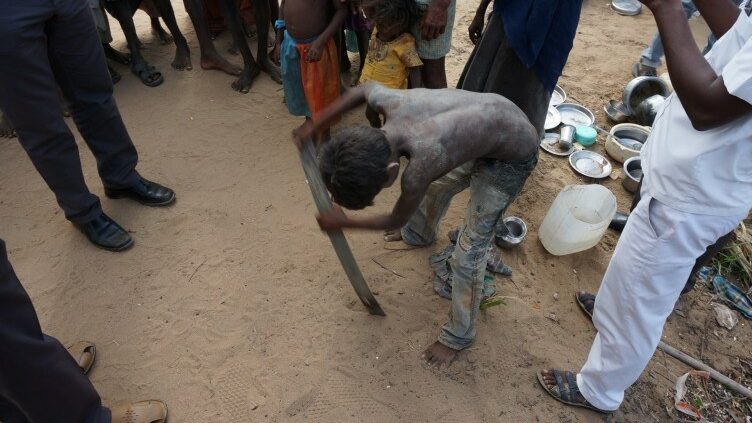Dozens Rescued From Slavery on Worm-Harvesting Farm
Slavery
CHENNAI, INDIA, July 17, 2015

By Sanjay Sojwal, IJM Director of Field Communications, who is in India on assignment.
Thirty people are now readjusting to life outside the confines of slavery. Just days ago, children and parents alike were standing in knee-high mud digging up mounds of clay and pulling out rusty-red worms. They were slaves.
Monday was an exhilarating and a draining day. My IJM colleagues and I joined local government officials and police to rescue the families from this worm-picking business.
We arrived at midday under a baking hot sun. We saw children, women and men with ruffled hair with sweat streaking down their faces walking to their four-feet high hovels made of straw arches covered with tarp.
When their sombre eyes met those of the local government officials and the two police escorts, they failed to light up.
Instead, fear mixed predominantly with a sense of silent resignation was writ on their faces, covered with dried clay which clung all over their hands and the men’s backs. The unshaven men and boys in no more than their underwear and the women in their worn dusty sarees stood passively, responding listlessly to the government officials’ queries about their life.
The officer in charge asked one of the boys, no more than 8 or 9, to demonstrate what work he did. The boy promptly picked up a steel strip modified from a truck suspension and drove the sharp end in to the ground to demonstrate how they dug the ground. All members of these five families who had mastered hand-eye coordination had been bonded to work in saltwater marshes to dig and harvest the six- to nine-inches long "centipede worms.” The work involved standing in knee-high salt water for hours digging for the worms, which had to be retrieved intact from the clay soil.
The slaves did not know exactly how the worms were being used. Some locals told them the worms were shrimp feed, and others heard the worms were being exported for pharmaceuticals.
When we arrived, the families had been working for about five hours. Between the five families, they had only about two handfuls of worms to show for their labour-intensive work that has left deep callouses and scars on their hands.
The rescue operation was over in minutes—the families hurriedly pulled the tarp covering their stick huts and rolled them up along with a few clothes and pans.
We travelled back to the local government headquarters and the rescued families ate a delicious biryani meal. This rice delicacy with meat and eggs was devoured in a hurry but in a near pin-drop silence.
I will not soon forget two girls who looked barely 13 and 15 years old—both were new wives.
The older of the two had a few-months old baby. I reflected on an enslaved father’s hard choices—the inability to protect his teenage daughter. In an apparent attempt to protect his daughter from the roving eyes of his owner, and to protect the family's honour, the girl had been given in marriage to another young fellow slave.
As officials interviewed the families to establish their identities and determine who had been forced to work as slaves, the children were kept amused with crayons and colouring books. I watched the two young wives eyeing the colouring books from the corner of their eyes. They slowly moved close to where the children were colouring and when offered crayons promptly accepted and began colouring the books with bright colours of hope.
Our night ended close to midnight. The official handed out official release certificates—their emancipation papers—and about $20 in emergency cash to each person.
Send urgent rescue to others held in forced labour slavery. Become a Freedom Partner today.